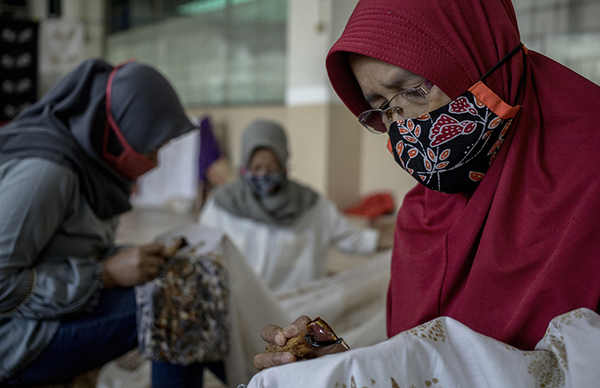ArtsEquator’s Southeast Asia Radar features articles and posts about arts and culture in Southeast Asia, drawn from local and regional websites and publications – aggregated content from outside sources, so we are exposed to a multitude of voices in the region. In the weekly Southeast Asia Radar, we publish a round-up of content that have been scoured and sifted from a range of regional news websites, blogs and media platforms.
Here is this week’s Southeast Asia Radar:

Local Batik Artisans Turn Masks to Fashionable Gear
Jakarta Globe, Indonesia
Jakarta. Marunda Batik, a community of low-cost apartment tenants-turned-artisans, are making use of their craftsmanship to add an exotic touch to facial masks.
Their workshop in Marunda Apartment, North Jakarta, has been quiet for some time due to the coronavirus outbreak. On Wednesday, these artisans had finally started to pick up their spouted tool or canting again to draw batik patterns for masks.
The idea for a batik mask came up after the government issued mandatory wearing of mask in public places, making the face covering a hot fashion accessory.

Chronicling the past
Bangkok Post, Thailand
Six creatives explore the state of Thai politics, censorship and abductions in ‘Conflicted Visions Again’
When the People’s Democratic Reform Committee (PDRC) held a mass rally against former prime minister Yingluck Shinawatra in 2014, WTF Gallery & Cafe hosted the “Conflicted Visions” exhibition and questioned if people could coexist despite different ideologies. A few weeks after the show ended, a coup took place and today Thais still live in a polarised society.
To mark its 10th anniversary, the gallery has reunited six veteran artists for the “Conflicted Visions Again” exhibition to illustrate Thailand’s political and social landscape over the past six years.
On view until Aug 23, the works — in various mediums — have been created by Manit Sriwanichpoom, Jakapan Vilasineekul, Miti Ruangkritya, Pisitakun Kuantalaeng, Sutee Kunavichayanont and Prakit Kobbkijwattana.

The keeper of vintage sounds in Saigon
Tuoi Tre News, Vietnam
Located in a small kiosk on Vo Van Ngan Street, Thu Duc District, Ho Chi Minh City is the radio repair shop of technician Tran Minh Tri and his son, which has been up and running for over four decades.
After a four-decade-long career, Tri has not lost his passion for rejuvenating antique radios and cassette players to retain the treasured memory of vintage sounds.
The repair shop of 67-year-old technician Tri catches the eye of passers-by with its old-school signage that has been kept from the early post-war years.
Tri learned the trade of radio repair from his brother and has kept the heritage alive in his shop for the past 40 years.

Artist Mervin Malonzo forays into animated horror in this adaptation of ‘Ella Arcangel’
Coconuts Manila, Philippines
Which direction does a National Book Awardee and a seasoned artist who’s spent the better part of his career making comic books and deconstructing Philippine monster mythologies go for his next passion project? For Mervin Malonzo, it turns out, the answer is animated horror.
Malonzo is known for founding indie comic press Haliya Publishing and for his books Pakikisalamuha (“Socializing”) and the acclaimed Tabi Po (loosely translated as “Let me pass”). But this time, the Parañaque-based artist is turning to his fellow horror artists for source material, churning out a series that he’s directed, animated, and even voiced himself.
The three-years-in-the-making project has already released one episode to date in its roughly 20-minute, 6-episode target, breathing life into Julius Villanueva’s 2017 comic book Ella Arcangel, about a young girl who is the city slum’s resident mambabarang (“sorcerer”). The animated series faithfully follows Arcangel’s adventures as she battles both men and mythical monsters or aswangs in the impoverished urban village.

Cambodian Artists, Art Groups Are Facing Their Own Virus Crisis
VOA Cambodia
BATTAMBANG & PHNOM PENH — Nov Sreyleak’s daily routine flowed as smoothly as her acrobatic movements. She would study English in the morning, after which she would work part-time at Siem Reap’s Phare Cambodian Circus.
Afternoons were spent rehearsing her routine, before it was time to welcome 400 or so excited guests for Phare’s daily performances. On stage, Nov Sreyleak, speaking from her home province of Battambang, was a lead female performer in the act, performing contortions and acrobatic movements.
That came to grinding halt with the novel coronavirus pandemic. Since mid-March, the Cambodian government prohibited all public gatherings, as the virus tally increased steadily in the country. All kinds of public performances were prohibited and the lull in tourism meant artists and communities struggled to find an audience.
With the circus shut in mid-March, Nov Sreyleak lost her job, her only source of income and, more importantly, her need to perform.
About the author(s)
Nabilah Said
Nabilah Said is an award-winning playwright, editor and cultural commentator. She is also an artist who works with text across various artforms and formats. Her plays have been staged in Singapore and London, including ANGKAT, which won Best Original Script at the 2020 Life Theatre Awards. Nabilah is the former editor of ArtsEquator.


